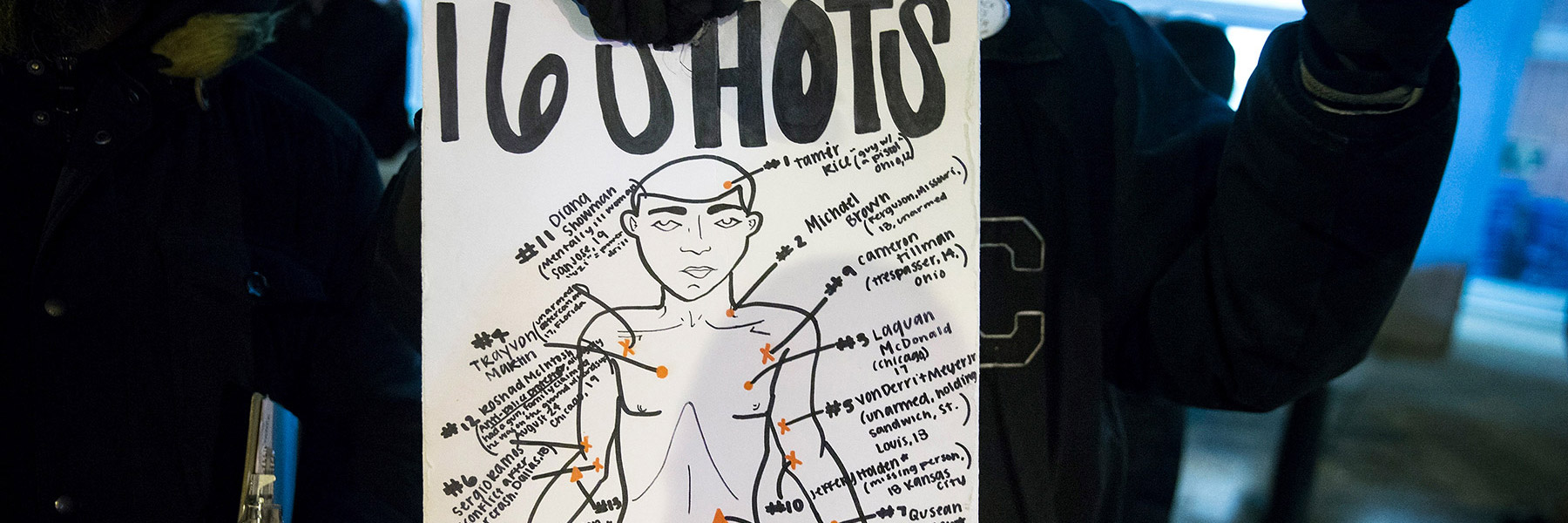
5 Roadblocks to Reform in Chicago's Police Union Contract
Critics say the city's agreement with the Fraternal Order of Police makes it more difficult to investigate and punish abuses.
June 26, 2017 | July Issue
The collective bargaining agreement between the city of Chicago and the Fraternal Order of Police (FOP) Lodge 7 will expire on June 30. With public interest in the upcoming round of negotiations on the rise, In These Times partnered with the civic journalism lab City Bureau, Invisible Institute and Injustice Watch to annotate the FOP contract in plain English. The full annotated contract, which can be viewed here, highlights significant articles and contextualizes them with case studies, expert analysis, media reports and more. Below is a summary of five key provisions that present a roadblock to police reform efforts.
5-year Time limit on investigating police misconduct
From 1972 to 1991, Chicago Police Commander Jon Burge and his so-called “midnight crew” allegedly tortured at least 120 people, mostly Black men, using electric shocks, smothering and beatings. Victims’ allegations were ignored for years, but Burge was finally fired in 1993. Soon after, the Fraternal Order of Police (FOP) lobbied for what became known as the “Burge rule”: a five-year statute of limitations on investigating misconduct, in both the union contract and Illinois law.
Chicago FOP Police Contract in Plain English
― 5-year Time limit on investigating police misconduct
Limitations on anonymous complaints
“Given the code of silence within CPD and a potential fear of retaliation, there are valid reasons a complainant may seek to report police misconduct anonymously,” wrote the Chicago Police Accountability Task Force in its April 2016 report. But anyone wishing to file a complaint about a police officer must sign a sworn affidavit in the presence of an investigator, who then provides the complainant’s name to the officer. From 2011 to 2014, the Independent Police Review Authority closed 58 percent of police misconduct complaints because they lacked an affidavit. Click here to read Adeshina Emmanuel's investigation on how this clause shields police misconduct.
Chicago FOP Police Contract in Plain English
― Limitations on anonymous complaints
Tax dollars for police misconduct
Between 2012 and 2015, the city of Chicago paid $210 million in settlements related to police misconduct, according to the Chicago Reporter. That’s because—unlike other large cities, including New York, Los Angeles and Philadelphia—Chicago’s police union contract, as well as Illinois state law, requires the city to foot the bill in civil suits against police. Officers accused of misconduct often face no further consequences.
Chicago FOP Police Contract in Plain English
― Tax dollars for police misconduct
Few consequences for falsifying statements
An August 2016 report by Chicago’s inspector general concluded that at least 10 officers had made or signed off on apparently false statements related to the fatal shooting of 17-year-old Laquan McDonald. Not only are police allowed to delay giving a statement for 24 hours after a shooting, but officers under investigation are frequently permitted to amend their statements after viewing the video or audio evidence against them.
Chicago FOP Police Contract in Plain English
― Few consequences for falsifying statements
Destruction of police disciplinary records
In 2014, the FOP went to court in an unsuccessful attempt to block Chicago from making public thousands of civilian complaints of police misconduct. The union contract requires destruction of police disciplinary records after five years. But under the Freedom of Information Act, journalists obtained 125,000 complaints dating back to 1967. The records reveal that in cases where investigators found evidence of wrongdoing, fewer than 0.5 percent of complaints resulted in termination of a police officer.
Chicago FOP Police Contract in Plain English
― Destruction of police disciplinary records
Excerpted from the Police Union Contract Tracker, a collaboration between In These Times reporter Adeshina Emmanuel, City Bureau and the Invisible Institute to annotate the FOP contract in plain English, with commentary from experts.
Want more independent news and analysis? Subscribe to the free In These Times weekly newsletter:
